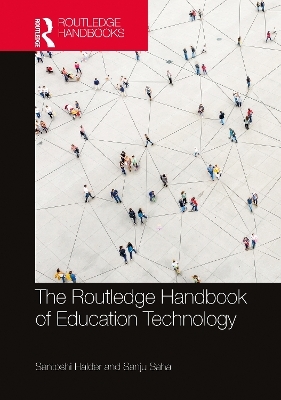
The Routledge Handbook of Education Technology
Routledge India (Verlag)
978-1-032-27196-5 (ISBN)
The volume examines diverse learning approaches such as assistive technology and augmentative and alternative communication for learners with disabilities and creating more social and accessible environments for learning through Collaborative Learning Techniques (CoLTS), massive open online courses (MOOCs), and the use of AI (Artificial Intelligence) in modern classrooms. Enriched with discussions on recent trends in ET (Education Technology), university curriculum and syllabi, and real-life examples of the use of ET in different classroom settings, the book captures diverse aspects of education technology and its potential. It also discusses the challenges of making technology and resources available for all and highlights the impact technology has had in classrooms across the world during the COVID-19 pandemic.
This book will be of interest to students, researchers, and teachers of education, digital education, education technology, and information technology. The book will also be useful for policymakers, educationalists, instructional designers, and educational institutions.
Santoshi Halder is a Professor at the Department of Education, University of Calcutta, India. She is a Board-Certified Behavior Analyst (BACB, USA) and Special Educator Licensure (RCI, India). Her specialization and primary focus of research range from Educational Technology (ET), Special Needs Education (SEN), and inclusion of people with diverse needs, to marginalized communities and minorities. Her recent book publications include Inclusion, Disability, and Culture (2017), Inclusion, Equity, Access for Individuals with Disabilities (2019), and Routledge Handbook of Inclusive Education for Teachers (2022). Her research work focuses on video modeling behavioral intervention for people with autism, marginalized and secluded communities, and finding constructive strategic pathways for the inclusion of people with diverse needs in low-, middle-, and high-income countries. Sanju Saha is an Assistant Professor at Ghoshpukur College, Siliguri, West Bengal, India. His research interests include instructional design, technological innovation for teaching-learning, instructional visualization, and technology-based design of learning materials to utilize human cognition.
List of Figures
Foreword
Preface
Acknowledgements
Part I: Fundamental Concepts and Theories
Chapter 1 Origin of Technology and Philosophy of Educational Technology
Chapter 2 Conceptual Orientation of Educational Technology
Chapter 3 Historical Evolution of Educational Technology
Chapter 4 Instructional Design in Education
Chapter 5 Communication and Communication Strategies
Chapter 6 Models and Patterns of Communication
Part II: Design, Evaluation, and Implementations
Chapter 7 System Analysis or System Approach in Education
Chapter 8 Models of Teaching
Chapter 9 Programmed Instruction
Chapter 10 Models of Teaching
Chapter 11 Cooperative Learning
Chapter 12 Theories and Techniques of Cooperative Learning
Chapter 13 Co-teaching Approach in Education
Chapter 14 Blended Learning in Education
Chapter 15 Assistive Technology and Augmentative and Alternative Communication
Chapter 16 Model and Universal Design Principles of Assistive Technology
Chapter 17 Intelligent Tutoring System (ITS) in Education
Part III: Large-Scale Instructional/Administration Tools, Techniques, and Initiatives
Chapter 18 Distance Education
Chapter 19 E-Learning in Education
Chapter 20 Massive Open Online Course (MOOC)
Chapter 21 Learning Management System (LMS) and Learning Content Management System (LCMS) in Education
Chapter 22 Social Media Applications in Education
Chapter 23 Various Social Media Platforms and Applications in Education
Chapter 24 Open Educational Resources (OER)
Part IV: Emerging Trends
Chapter 25 Computer in Education and Its Application
Chapter 26 Information Communication Technology (ICT) in Education
Chapter 27 Games, Gamification, and Simulation in Education
Chapter 28 Mobile or M-Learning in Education
Chapter 29 Artificial Intelligence in Education
Chapter 30 COVID-19 Pandemic: Educational Strategies and Resources during Crises and Emergencies
Index
| Erscheinungsdatum | 27.06.2022 |
|---|---|
| Zusatzinfo | 60 Tables, black and white; 68 Line drawings, black and white; 12 Halftones, black and white; 80 Illustrations, black and white |
| Verlagsort | London |
| Sprache | englisch |
| Maße | 174 x 246 mm |
| Gewicht | 907 g |
| Themenwelt | Schulbuch / Wörterbuch ► Unterrichtsvorbereitung ► Unterrichts-Handreichungen |
| Mathematik / Informatik ► Informatik | |
| Sozialwissenschaften ► Pädagogik | |
| Sozialwissenschaften ► Soziologie ► Spezielle Soziologien | |
| ISBN-10 | 1-032-27196-5 / 1032271965 |
| ISBN-13 | 978-1-032-27196-5 / 9781032271965 |
| Zustand | Neuware |
| Haben Sie eine Frage zum Produkt? |
aus dem Bereich


